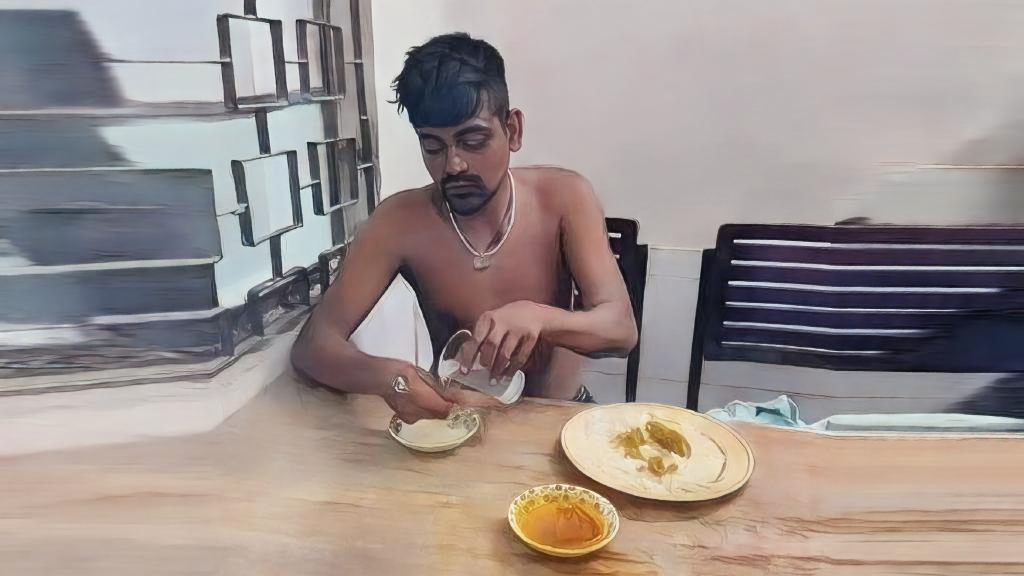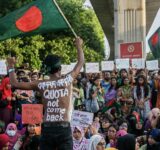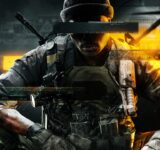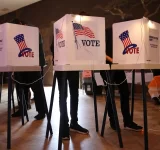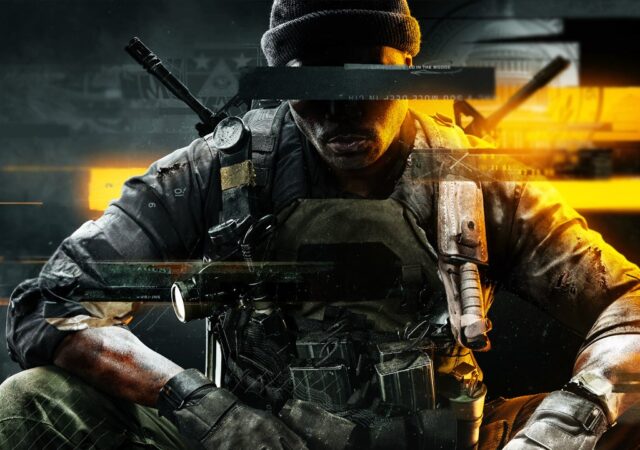In the late hours of a Wednesday night, Tofazzal was mercilessly beaten to death by a group of students from Fazlul Huq Muslim Hall, on the premises of Dhaka University (DU). For most residents of that hall, he was a familiar face—someone who often roamed the area in search of food. Yet, when he was suspected of theft, these students did not think twice before killing him.
A disturbing series of social media posts have recently taken the internet by storm, showing these students providing Tofazzal with dinner—the infamous watery ‘dal’ of DU halls. He is seen relishing the meal, even commenting on how the quality of food was good. For anyone familiar with DU life, it is no secret how terrible the hall meals are. I can only imagine how hungry this man must have been to find comfort in his ‘last supper.’
I have read countless accounts of that night, trying to make sense of how something like this could happen at a place I was once so proud to call my own. The more I know, the more suffocated I feel.
This was a mob lynching. A man was murdered—no trial, no due process—within the walls of an institution I believed stood for something better. As a DU student, I am left ashamed, appalled, and deeply hurt by this incident. The same university that played a critical role in the recent student revolution now witnesses the very students who are supposed to uphold its legacy engaging in vigilante justice.
This is not just a failure of individuals; it is a failure of the entire system that allowed it to happen, and I fear it sets a dangerous precedent for the future. At the end of the day, the oppressors change, but the oppressed always remain.
What is especially appalling in this case is the fact that the oppressors are students who fought against the injustice of a fascist regime just a few weeks ago.
Mob justice is never justice; it is nothing more than an expression of uncontrolled power, and absolute power, as we have seen, corrupts absolutely. In this case, it corrupted a group of young minds—minds that should have known better. Instead of following due process, they acted as judge, jury, and executioner. They confined Tofazzal, accused him without trial, beat him, and left him to die, without even the decency of taking him to a hospital in time. This is not just a crime; it is a symbol of the breakdown of order, of society giving in to its most primitive instincts. In moments like these, lawlessness replaces justice, and the rule of law is forsaken. When you give a group of people sudden power, they begin to believe they are untouchable—this rings a bell for most of us. This is what we are seeing now, and it is terrifying. No individual or student organization should ever have this kind of power.
As students, we were supposed to lead by example, to champion what is right and just. Instead, this shows that we are failing at our most fundamental task: to be responsible citizens.
It is time we remember that the power of law does not lie in the hands of our student leaders, no matter how righteous they believe their cause to be. The power to judge and punish lies with the greater institutions of society—institutions built on the principles of justice and fairness. Justice is not for the strongest; it is for the righteous. And no one has the right to take that away—not even in the name of the people.
We fought hard for our freedom, but incidents like this put our revolution to shame. They belittle everything our student community has achieved, often at the cost of their lives. The halls of DU, once the birthplace of resistance and reform, cannot be allowed to become a breeding ground for lawlessness. This brings us back to square one as we become the very power we defeated just a month ago.
I did not feel safe back in July when Bangladesh Chhatra League (BCL) mercilessly attacked protesting students on my campus. I do not feel safe today, thinking that I belong to an institution where we tortured an accused person to death. As a student, I cannot simply watch this unfold and do nothing. This is personal. It feels like a betrayal of everything I believed in—everything my institution is supposed to represent. And it hurts to say that I no longer feel the pride in being part of DU. How can I, when my fellow students have committed such a crime and so many remain silent, refusing to confront the reality of what has happened?
Let me make this clear: nothing can justify an incident like this. No amount of anger or frustration gives anyone the right to take another’s life. An eye for an eye leaves the whole world blind, and what we are witnessing now is a classic case of power blindness.
We cannot excuse this as an isolated incident, nor can we hide behind the excuse that “we did not know better.” We know better. And knowing better, we are held to a higher standard. This is not just about Tofazzal. This is about the kind of society we want to build. Do we want a society where mob justice reigns, where might makes right, where the strong can destroy the weak without consequence? Or do we want a society where justice is delivered fairly, where every individual—no matter how poor, how powerless, or how despised—has the right to due process? The answer should be obvious.
The absence of accountability is a tragedy in itself. I have already seen many students begin to shift the blame to the BCL, as though this absolves them of their own complicity. Blame-shifting only delays the inevitable: accountability. Whether or not the BCL is involved, each and every individual who was present, who participated, or who stood by and did nothing is culpable. We did not overthrow one dictatorial regime to breed another. It disgusts me that, after all that has been sacrificed to build this university into what it is today, we are witnessing its downfall at the hands of the very students who should be upholding its values.
We simply cannot allow this incident to be swept under the rug. We must demand justice, not just for Tofazzal, but for ourselves—for the students who are watching, learning, and growing on this campus.
He did not deserve to die this way, and nothing—absolutely nothing—can justify what happened to him. I do not remember the last time a loss felt this personal and I felt this helpless. Maybe it was during the previous regime? If that is the case, should we not know how to act better? In the words of one of our great thinkers, “Justice delayed is justice denied.” But in this case, justice was not just delayed—it was denied entirely. And that is a failure we must all bear.

